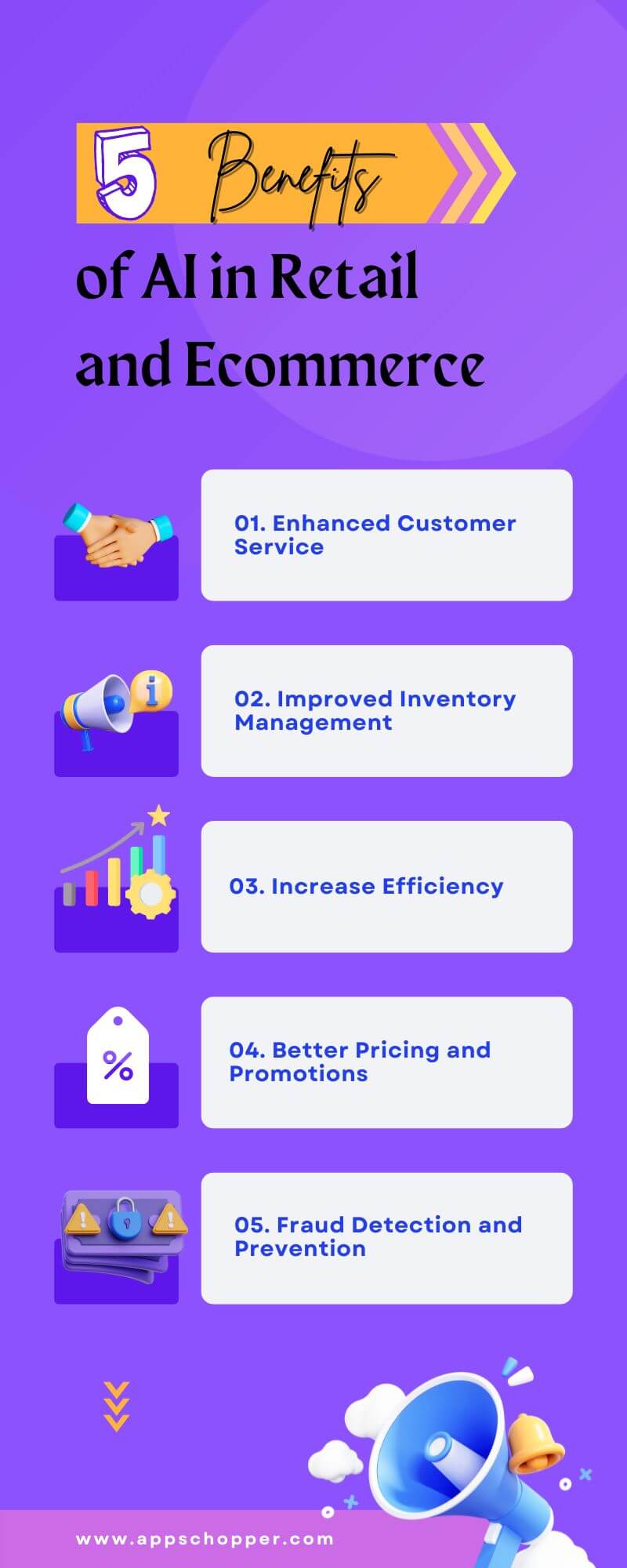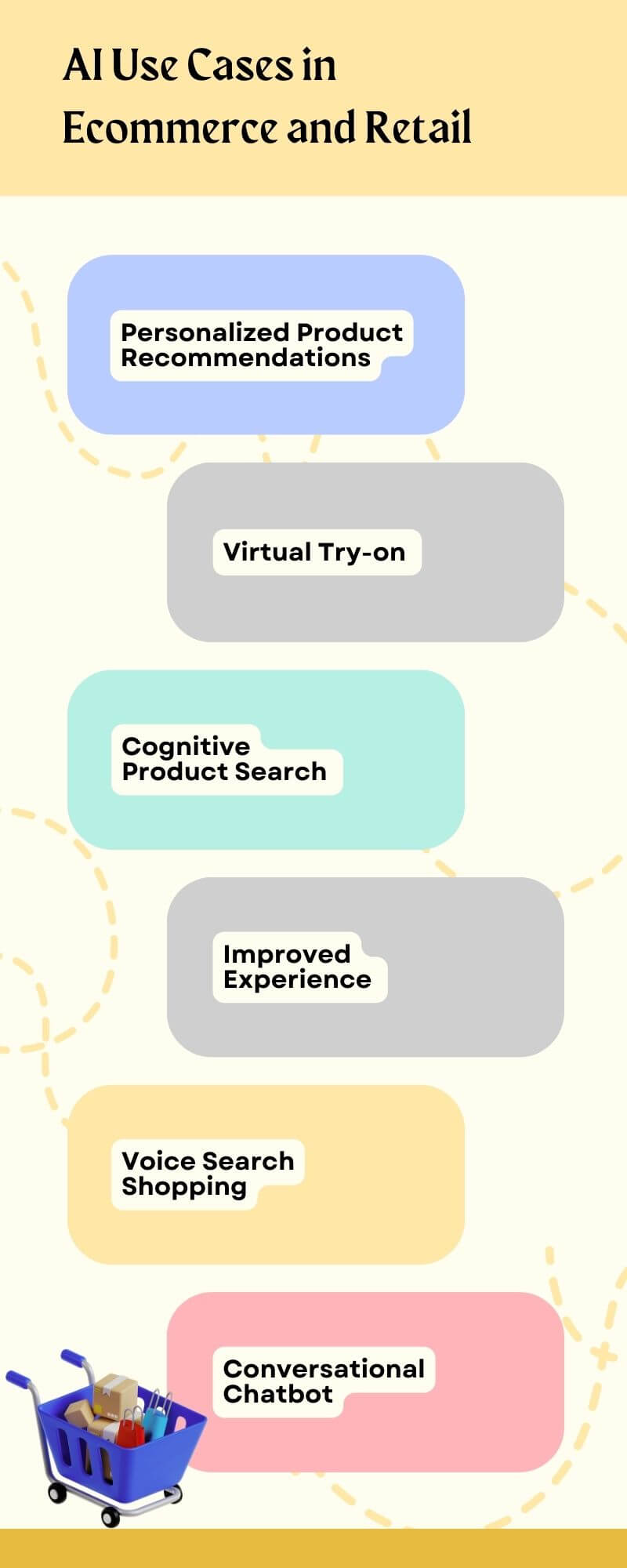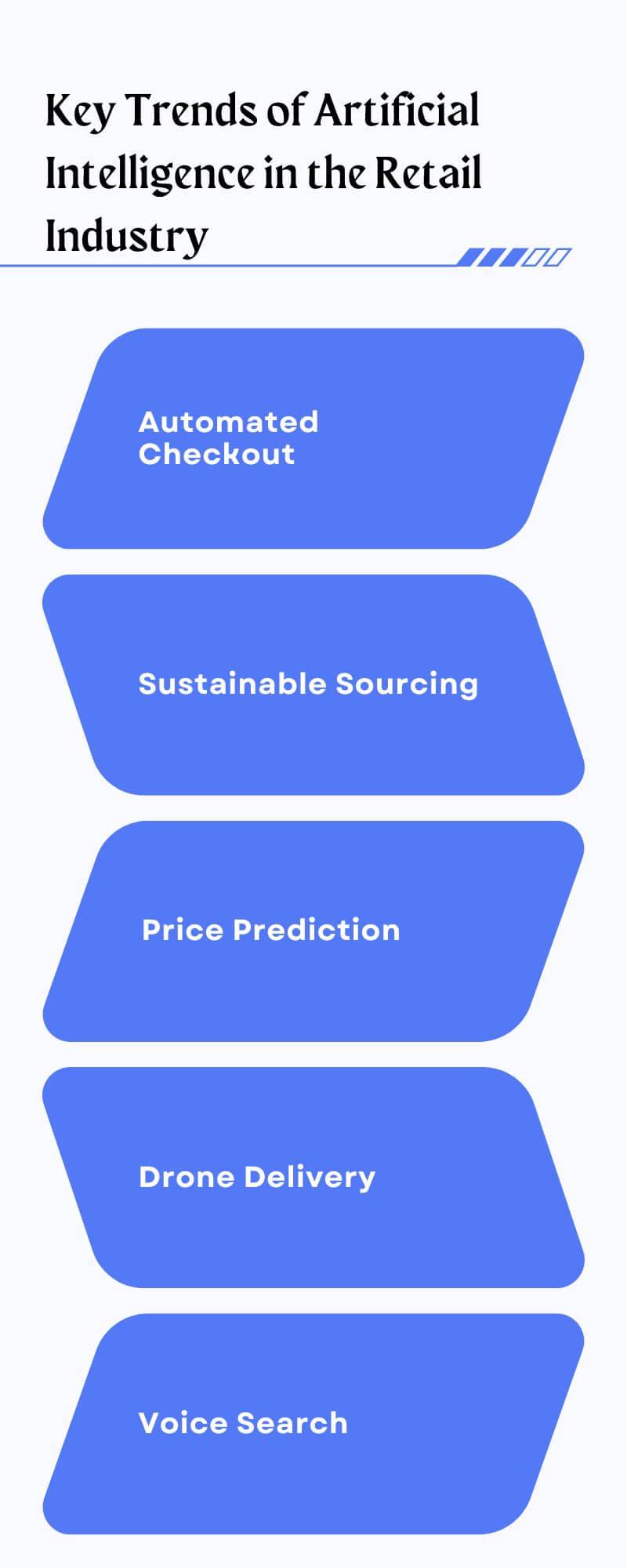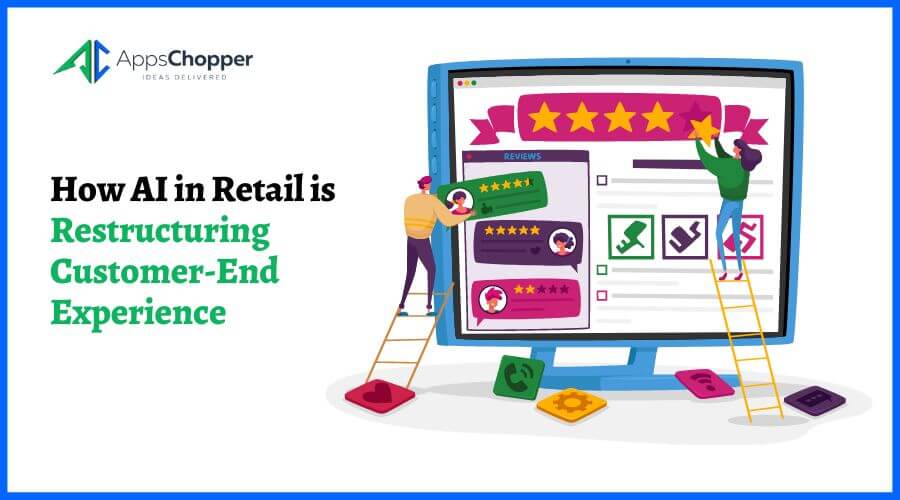Table of Contents
Artificial intelligence in retail is incorporating a potent dose of changeover into the industry. It’s exhilarating for retailers to optimize their processes, analyze inventive practices to engage with customers and prioritize customer experience with intelligent automotive solutions. AI is clearing the way for an efficacious and customer-centric retail environment.
The foremost concern of the decade is personalization for retail expansion. However, the industry faces digital enthusiasts wanting to integrate shopping experiences with intelligent preferences. Establishments and businesses prefer artificial intelligence to provide impeccable operations and experience on these anticipations, with its capability to comprehend customer expectancy.
However, the passage to profit is not without hindrances. Retailers are struggling with economic unpredictability, geopolitical disturbances, and the climate emergency, among other challenges. Bearing and steering these challenges can strain contemporary tactics and strategies. Still, AI presents a calculative lens, offering analytics and forecasting to assist retailers acclimatize to any type of issue.
AI in Retail Industry: Market Overview
AI in the retail industry, with an app development agency, is restructuring how customers interact with products and proceed to shop, building a riveting and efficacious experience for both businesses and customers.
With the AI market projected to reach $45.74 billion by 2032, it’s clear that AI is here to stay, having catalyzed the Fourth Industrial Revolution. This is not just a prognosis but a reality. According to Analytics Insight reports, by 2025, 80% of retail decision-makers envision intelligent automation technologies will power their organizations, and 40% are already implementing them. This global adoption of AI in the retail industry infuses confidence in its applicability and prospective growth.
Role of Artificial Intelligence in Retail
Rotkäppchen-Mumm, Germany’s most extensively manufactured sparkling wine company, uses AI to upturn the shopping experience with online shopping app development. This winery conducts real-time dynamic propogative content on digital motions in its shops. The sign content interconnects with the updated sales data and analytics to confirm a specific product would not be advertised on display if unavailable. They also operate these digital signs connected with RFID tags, object recognition, and near-imperceptible sensors to display immersive content near the screen.
Retailers are also probing ways AI can assist in simplifying their administrative procedures, administering employees in redundant and monotonous tasks, and bringing new perspicuity for data-driven decision-making. Increasingly, retail corporations are skimming at how more convoluted kinds of AI, like deep learning, computer vision, or generative AI, can better assist them in foreseeing customer needs. This differentiates their brand in overcrowded and competitive spaces.
Benefits of AI in Retail and Ecommerce
The benefits of artificial intelligence and machine learning in retail modify contemporary slow-paced processing. Personalization on a global level, a transformation of basic inventory management, and accurate price prediction with AI are propagating retail toward an inventive future. To examine the advantages of AI in revolutionizing the industry, let us read the pointers mentioned below.

1. Enhanced Customer Service
The core of any retail business lies in customer service: How well do they respond to customer inquiries and resolve them in a timely manner? Since the adoption of AI, customer interaction has become the epitome of advantageous use of intelligent technologies. With AI app development services and the immense experience of developers, retailers are incorporating conversation chatbots and virtual assistants that eliminate the need for excessive customer care recruitment. These cognitive technologies present enhanced customer service options while staying within budget.
2. Improved Inventory Management
There are two factors that result in poor inventory management: low efficiency and confounded product demand. To change the statistics and boost revenue, retailers must focus on the core of their businesses, smooth inventory management. This is where artificial intelligence and machine learning in retail become the savior. AI and Ml primarily predict the upcoming demand, identify unusual patterns, and automate customer restocking. This improves the efficiency among the staff to make informed decisions and brings forth the concept of streamlined inventory management.
3. Increase Efficiency
Tedious tasks in the retail industry can consume the valuable time of staff and produce monotonous outcomes that can lower efficiency. Retailers must always remember to infuse AI technologies for retail automation and eliminate repetitive tasks to boost individuals’ efficacy. The more time for creative work, the better the efficiency level. Mindless and repetitive work can lead to non-productive and slow revenues. This does not end with the work staff and crew; the aftermath is reflected in enhanced customer experience. The energy and time will be the same, but the outcome will differ.
4. Better Pricing and Promotions
The retail industry thrives on the offers it presents to customers and helps them make financially sound decisions. Constantly modifying pricing can be time-consuming. Retailers require a system that analyzes the market and competitors’ pricing to change it as per the standards. This way, AI in online shopping can be competitive on global pricing while offering an efficient way for customers to go shopping.
5. Fraud Detection and Prevention
Cyberattacks these days test the capabilities of solutions instilled by retailers to secure user data. If your security systems are compromised on any level, penetrating them takes less than a minute. With AI in retail business planning for impeccable expansion, data security and confidentiality become aspects that can never be ignored in the foreseeable future. With predictive analysis and pattern configuration, the system and apps prevent fraudulent activities at both ends, presenting a secure space for everyone.
AI Use Cases in Ecommerce and Retail
Generative AI in the retail industry offers numerous possibilities for using AI beyond enhancing customer experience to maximize business expansion. Retail app development simplifies business functions and encourages retail businesses to reform their existence in the market. Take a glance at some impressive AI applications in retail mentioned below.

1. Personalized Product Recommendations
As more customers want brands to comprehend their preferences, AI is fitting as a primary game-changer. 75% of retail consumers are likelier to purchase from brands that personalize their shopping experience. That being said, it must not be unexpected that organizations choose to deploy AI solutions on a larger scale than ever.
AI permits you to examine large amounts of consumer data and information, such as the items added to a wishlist, browsing and purchase history, and location. This level of research means that businesses and retailers can present product recommendations based on their customers’ preferences and choices. This streamlines shopping and makes the experience enjoyable, helping customers toward more reasonable purchase determinations.
2. Virtual Try-on
One expected challenge consumers often encounter when shopping for dresses and other wearables online is confirming the flawless fit. Apparently, the days of depending exclusively on static pictures to visualize how a product might appear or fit are gone.
Now, with the virtual try-ons driven by artificial intelligence, consumers can envision how accessories, makeup products, clothes, and even furniture commodities will appear or fit them and their rooms. The result? Decreased product return rates and expanded customer satisfaction.
3. Cognitive Product Search
Why do consumers leave an online front hanging without purchasing anything? The top explanation is the unavailability of what they must be looking for and the inability to find it. Between 17% and 20% of consumers give up their hopes after just one random search and get busy. These deserted shopping expeditions have a significant influence, costing retailers $330 billion in 2021 due to search-related issues.
AI-driven apps can seize context and purpose, facilitating shoppers’ input of any keywords and acquiring accurate, suitable search outcomes. Further, as they stimulate expansive data and comprehend each shopper’s choices, the outcomes become personalized to each person over time.
4. Improved Experience With Visual Product Search
Studies reveal that 74% of online shoppers strive to find their desired products in the pile of multiple products. This highlights the necessity for more useful search abilities, with graphical search appearing as an advantageous solution. It’s figured that the global visual search market will reach an aggregated amount of $33 billion by 2028.
Visual search technology utilizes image distinction and AI algorithms to facilitate users’ digging for products using images rather than text. Offering a more perceptive, immersing, and competent method to locate and buy products becomes essential, particularly in a world where 90% of information transferred to the human brain is optical.
5. Hands-Free Shopping Through Voice Search
AI welcomes another prospect in retail: voice search, which encourages customers to browse products and buy products without scrolling for hours. They can utilize voice controls via smart speakers like Apple’s Siri, Google Assistant, Alexa, or other voice-activated media. Many retailers also create voice-enabled shopping experiences word-for-word integrated with their apps.
6. Streamlined customer service with AI chatbots
AI-powered chatbots and virtual assistants are altering the course of customer service operations in retail. These intelligent conversational agents can respond to customer questions, provide product information, and offer assistance around the clock. 64% of consumers interact with a chatbot rather than wait for a human representative.
By getting chatbot development services and building chatbots, stores can respond to customer messages quickly, enhancing customer satisfaction. Since 75% of consumers enlist through numerous channels throughout their experience, AI guarantees constant service across all platforms.
Key Trends of Artificial Intelligence in Retail Industry
The usage of AI in retail is expanding expeditiously, thanks to its capability to assist retailers in reasonably comprehending consumer behavior, enhancing operational efficiency, and improving the comprehensive customer experience.

1. Automated Checkout with Cashier-less Stores
A future of AI in retail to eliminate friction and welcome a cashier-less checkout system is on the go. The retail industry is finishing the need for monotonous tasks that AI can automate. The automated checkout offers a cashier-free module to stores where customers can pick up their purchases, and AI systems can charge them for their purchases. This upcoming trend brings a cost-effective and monitored solution to retail stores.
2. Sustainable and Ethical Sourcing
The world is pursuing sustainable and ethical options to safeguard the future of the next generations. Making environment-friendly choices is becoming a part of customers’ lives, so they shop responsibly. AI in retail is bringing forth the generation of wise and sustainable products with product monitoring and verification. The overlapping of AI and sustainable systems lead customers and the industry toward an increasingly eco-friendly, technologically advanced future.
3. Price Prediction
The accurate price prediction features work on factors like changing product demand and the seasonal. With the infusion of artificial intelligence in retail, customers can move towards better shopping planning per their budget. Accurate price prediction benefits customers and retail companies to stay in business, keeping the market competition in mind.
4. Drone Delivery
Drone delivery is not a trending subject for the emerging years, but it was one of the concerns being worked on, parallel to the adopting years of AI. The news regarding the success of drone delivery has been the talk of the town for years, but with AI’s incorporation, the concept is changing slightly. Recently, Amazon gained approval for self-piloting delivery drones that revolutionized the market in the context of one-day delivery. Tweaking the former mechanism and offering efficacy to the delivery department in the retail industry is a futuristic approach.
5. Voice Search
Integrating voice search features in the retail industry connects sci-fi books and movies. Voice command functioning was one of the anticipated elements discussed in AI-centric cinema. An automated entity taking care of groceries and shopping wishlists simply on command is a fascinating concept now and then. The AI mechanism enabling voice commands like Alexa or Google Assistant transforms the retail industry.
AI in Retail App Development Cost: A Necessary Breakdown
The retail industry’s artificial intelligence app development cost can range from $30,000 to $100,000, depending on necessary factors. Those critical factors include the app’s intricacies, incorporated feature sets, or the technology stack used during development.
The cost relies not only on app-based factors but also on factors that overlap with the choice of the retail app development company. The location, the per-hour rate, and the experience of the professionals also influence the final app development cost.
Choosing AppsChopper as Your Trusted Retail App Development Company
A futuristic approach is essential for developing retail apps that expand retailers’ and enterprises’ businesses. From automating repetitive tasks to enabling pattern-based analysis on multiple levels, retail AI revolutionizes the industry’s comprehensive functioning.
With AppsChoppers as your trusted and dependable app development company, retail businesses can fly up the market and land at the top of the competition. We guarantee them with intelligent solutions and cognitive technologies combined with our 16+ years of experience in different verticals.








